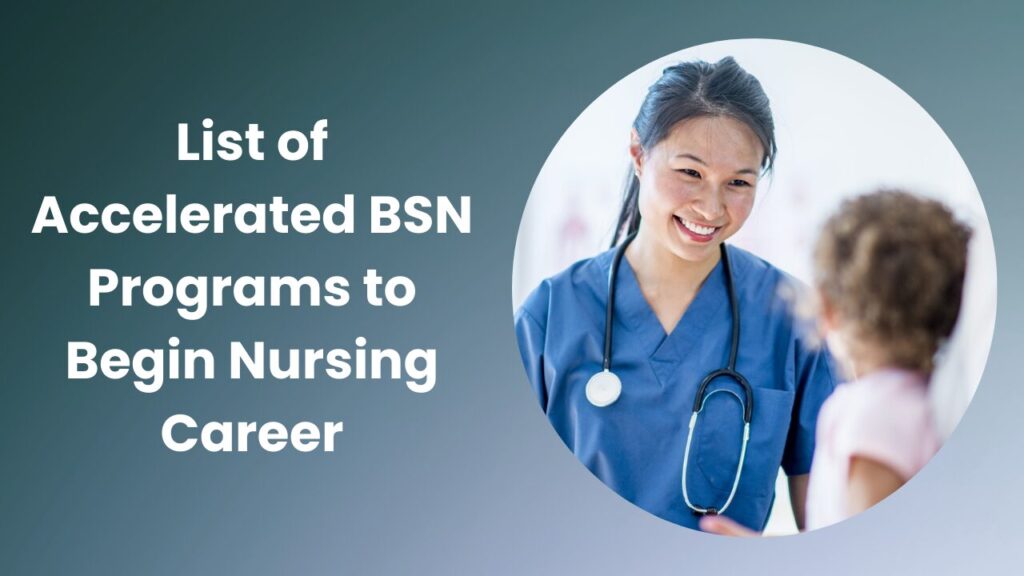Accelerated BSN programs offer a powerful pathway for individuals who already hold a bachelor’s degree in a non-nursing field to switch careers and become registered nurses in significantly less time than the traditional four-year BSN. In this article we explore a comprehensive list of accelerated BSN programs, explaining what accelerated BSN means, looking closely at many top programs throughout the U.S., and helping you evaluate which program might suit you best. You will see key features, durations, prerequisites, costs, and outcomes, plus answers to common questions.
What Is an Accelerated BSN Program?
Accelerated BSN (ABSN) programs are intensive, fast-track nursing degree programs designed for students who already have a bachelor’s degree in another discipline. Because many general education and foundational science requirements are already met via the previous degree, these programs condense the nursing curriculum into a shorter time span often 12 to 18 months. ABSN curricula typically include didactic (lecture/theory) courses, clinical rotations, simulation labs, and hands-on patient care experiences. Students must be prepared for a demanding schedule, often no summer breaks, continuous coursework, and frequent assessments. After completion, graduates are eligible to sit for the NCLEX-RN exam to become licensed registered nurses.
Why Choose an Accelerated BSN?
Choosing one of the accelerated BSN programs means you can enter the nursing field much sooner, which may lead to earlier employment and income potential. Many health systems prefer BSN-prepared nurses for advanced roles, leadership, and specialty units. Accelerated BSN also signals a high level of commitment and maturity since students are juggling heavy course loads and intense clinical experiences. Furthermore, with projected job growth for registered nurses exceeding many other occupations, completing one of the accelerated BSN programs positions you well in a competitive job market.
List of Accelerated BSN Programs
Below are detailed explanations of several accelerated BSN programs.
University of Kentucky Accelerated BSN Program
The University of Kentucky offers an accelerated BSN (ABSN) track lasting 16 months, including summer term, designed for students who already hold a bachelor’s degree, have served as a medic in the military, or hold an active LPN license. The program carries 54-55 credit hours, accommodates a block schedule of eight consecutive blocks combining online lectures and in-person labs and clinicals. Graduates are eligible to take the NCLEX-RN and the university holds accreditation with the Commission on Collegiate Nursing Education. Clinical rotations, simulation labs, and faculty support are strong points. Financial aid opportunities exist, and the program expects a rigorous, full-time commitment.
Thomas Edison State University
Thomas Edison State University provides a 12-month full-time accelerated BSN for those with a non-nursing bachelor’s degree. The program combines online and in-ground classes plus intensive clinical experiences. Students are expected to have all prerequisite coursework in sciences and general education before entry. The pace is swift, with continuous study over the year with little or no breaks. Upon completion, graduates are prepared to sit for NCLEX-RN. Because it builds on prior education, this program emphasizes academic readiness and time management.
Baylor University Accelerated Online ABSN Program
Baylor University’s distance accelerated BSN program is tailored for students who already have a non-nursing bachelor’s degree. It can be completed in as little as 12 months, includes 62 credit-hours of nursing coursework, blends online content with in-person clinicals. The curriculum is fully accredited by the Commission on Collegiate Nursing Education (CCNE). Students must meet science prerequisites and engage in hands-on clinical training at local health facilities. This program offers cost transparency, strong accreditation, and accelerated timelines for motivated students.
University of Wisconsin Oshkosh
The University of Wisconsin Oshkosh offers an accelerated BSN program that can be completed in 12 months for those with a previous non-nursing degree. Courses are delivered online for theory portions, while labs and clinical experiences are arranged locally. The tuition and credit requirements are reasonable compared with many programs, making it attractive for those seeking affordability. It emphasizes NCLEX-RN preparation and practical clinical exposure. The hybrid format offers some flexibility while maintaining rigorous standards.
Misericordia University ABSN Program
Misericordia University in Pennsylvania offers an ABSN program designed for individuals who possess at least 30 non-nursing college credits. The program is structured to be completed in about 16 months, over four full-time semesters. It combines online coursework, hands-on skills labs and simulations, and on-site clinical rotations. Total credit hours are approximately 54, and students are expected to maintain continuous enrollment. Graduates are prepared for the NCLEX-RN and report strong student support and favorable outcomes.
Holy Family University Accelerated BSN Program
Holy Family University’s accelerated BSN program enables non-nursing bachelor’s degree holders to finish their BSN in 14 months. The curriculum merges online theoretical learning with required in-person clinical experiences. Prerequisites in science and general education must be satisfied before starting. The program emphasizes patient care, pharmacology, pathophysiology, and ethical practice. Its accreditation is solid and it is considered an affordable option among many ABSN programs.
Additional Accelerated BSN Programs
Here are more programs you should know, explained in moderate detail.
Keiser University Ft. Lauderdale ABSN
Keiser University in Ft. Lauderdale offers an ABSN track of approximately 16 months for students with prior degree credentials. The program includes classroom lectures, clinical rotations, and lab practice. It’s designed to help students swiftly transition into nursing while covering core nursing theory, health promotion, and specialized care topics. The cost per year, while substantial, is balanced by the faster finish and solid support services. Students can expect a rigorous schedule
University of Massachusetts Boston
UMass Boston offers a hybrid accelerated BSN aimed at high achieving students who hold a non-nursing bachelor’s degree. The ABSN can be completed in 12-15 months, combining online coursework with on-site labs and clinical experiences in healthcare settings throughout Massachusetts. Students benefit from flexible scheduling in theory, but intensive clinical work is scheduled in person. The curriculum emphasizes evidence-based practice, community health, and leadership.
University of Wyoming Accelerated BSN
The University of Wyoming offers an accelerated BSN for those with previous degrees, combining online and hybrid learning with required clinical practice. The program usually spans four semesters and is designed to deliver solid NCLEX-RN preparation. Tuition per credit, student outcomes, and clinical experiences are highlights that many past students report as strong.
Key Features & Considerations to Compare
When you are looking through the accelerated BSN programs, certain factors repeatedly pop up as important. First, duration: some programs are as short as 12 months, others take 16-18 months. Secondly, prerequisite completion matters greatly; you’ll need certain science and general education credits before entry. Thirdly, accreditation (e.g. CCNE, ACEN) is essential to ensure your NCLEX-RN eligibility and program quality. Fourth, cost: tuition per credit, fees, travel or relocation for labs/clinicals, plus living expenses. Fifth, format: fully online vs hybrid vs in-person; online theory may offer flexibility but clinicals must occur in person. Finally, NCLEX-RN pass rates and student support services (simulation labs, mentorship) are leading indicators of program effectiveness.
DMA in the Context of ABSN Programs
Here DMA refers to “Designated Market Areas” in some contexts, but in the context of accelerated BSN programs, DMA might refer to Distance, Delivery, Modality, Access (the ways the program is delivered and accessed). Many accelerated BSN programs use hybrid or online modalities for lecture/theoretical content, while requiring in-person clinicals and labs. This “delivery modality” affects scheduling, commuting, and overall workload. Students in DMA/hybrid formats often have to travel for labs or clinicals or may have short on-campus residencies. These formats offer more flexibility but often at cost of more planning and logistical work. In general, DMA formats allow access from wider geographic areas and help those who are working or have family obligations, but students must ensure that the clinical placements are local and the program is approved in their state.
How to Choose the Right Accelerated BSN Program
To choose the best program for your needs, start by determining your eligibility: do you meet the prerequisites and previous degree requirements. Next, decide how much time you can commit, whether you need a program with online components, and whether you can relocate or commute for labs and clinicals. Compare tuition and fees, and check financial aid or scholarship availability. Examine NCLEX pass rates and outcomes of previous graduates, as these reflect how well the program prepares students for practice. Talk to alumni or current students if possible. Also verify state licensure acceptance, especially if you plan to practice in a different state than where the school is located. Finally, think about the support services: mentorship, faculty access, and simulation resources, because the workload is intense and strong support can make a big difference.
Conclusion
The journey through the list of accelerated BSN programs shows that there are many strong options for switching careers into nursing in a shorter timeframe without compromising on quality or outcomes. Accelerated BSN programs enable dedicated students with prior degrees to finish a BSN in 12-18 months, complete rigorous clinical training, and sit for the NCLEX-RN exam. Whether you prioritize cost, duration, hybrid/online delivery, or support services, the programs described above give you a solid foundation to choose from. If you are ready to work hard, manage time well, and commit to a fast-paced curriculum, one of the accelerated BSN programs may be exactly the path you need to enter the nursing profession sooner than you expected.
FAQs
What is the minimum requirement to enter an accelerated BSN program?
A non-nursing bachelor’s degree plus science prerequisites like anatomy, physiology, and microbiology. Some schools also require a GPA of 2.5–3.0.
How long do accelerated BSN programs usually take?
Most programs last 12 to 18 months of full-time study, depending on school structure and prerequisites.
Are online accelerated BSN programs valid?
Yes, if accredited by CCNE or ACEN. Lectures may be online, but labs and clinicals are always in person.
What is the biggest challenge of an accelerated BSN?
The workload is very intense with little break time, making time management and focus essential.
Do accelerated BSN programs cost more than traditional BSN?
They often have higher per-credit tuition but save time overall since you graduate faster and enter the workforce sooner.





